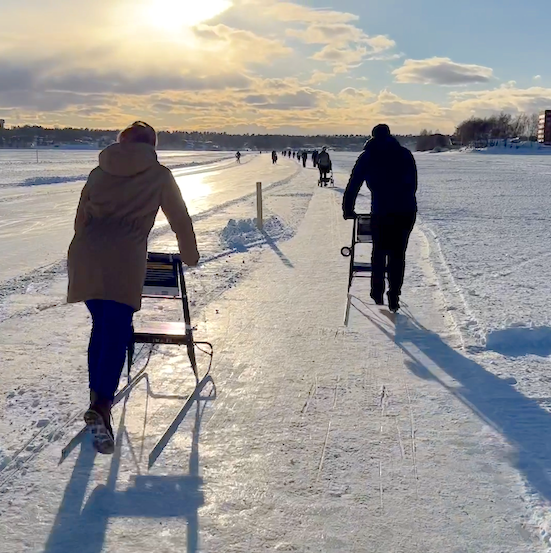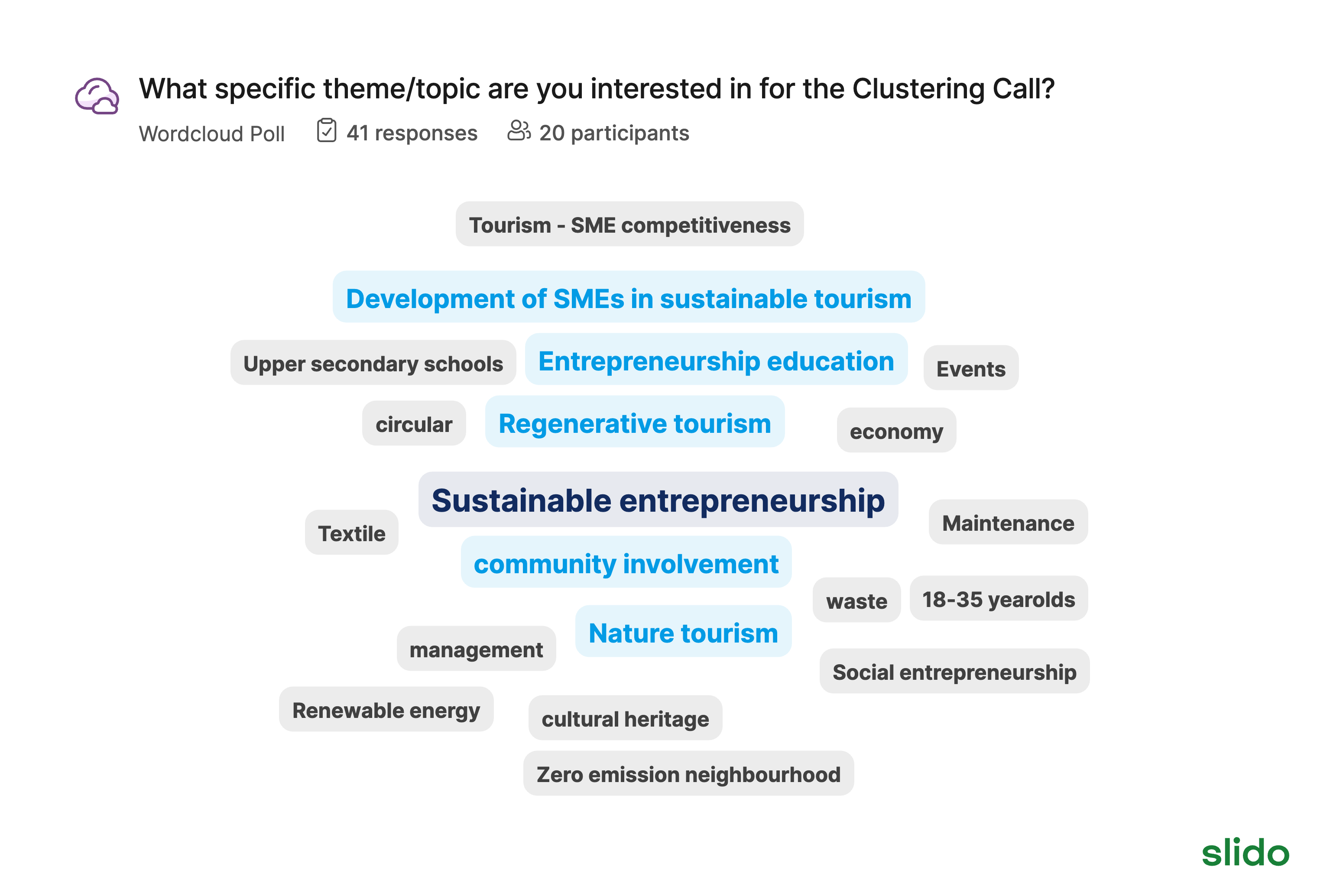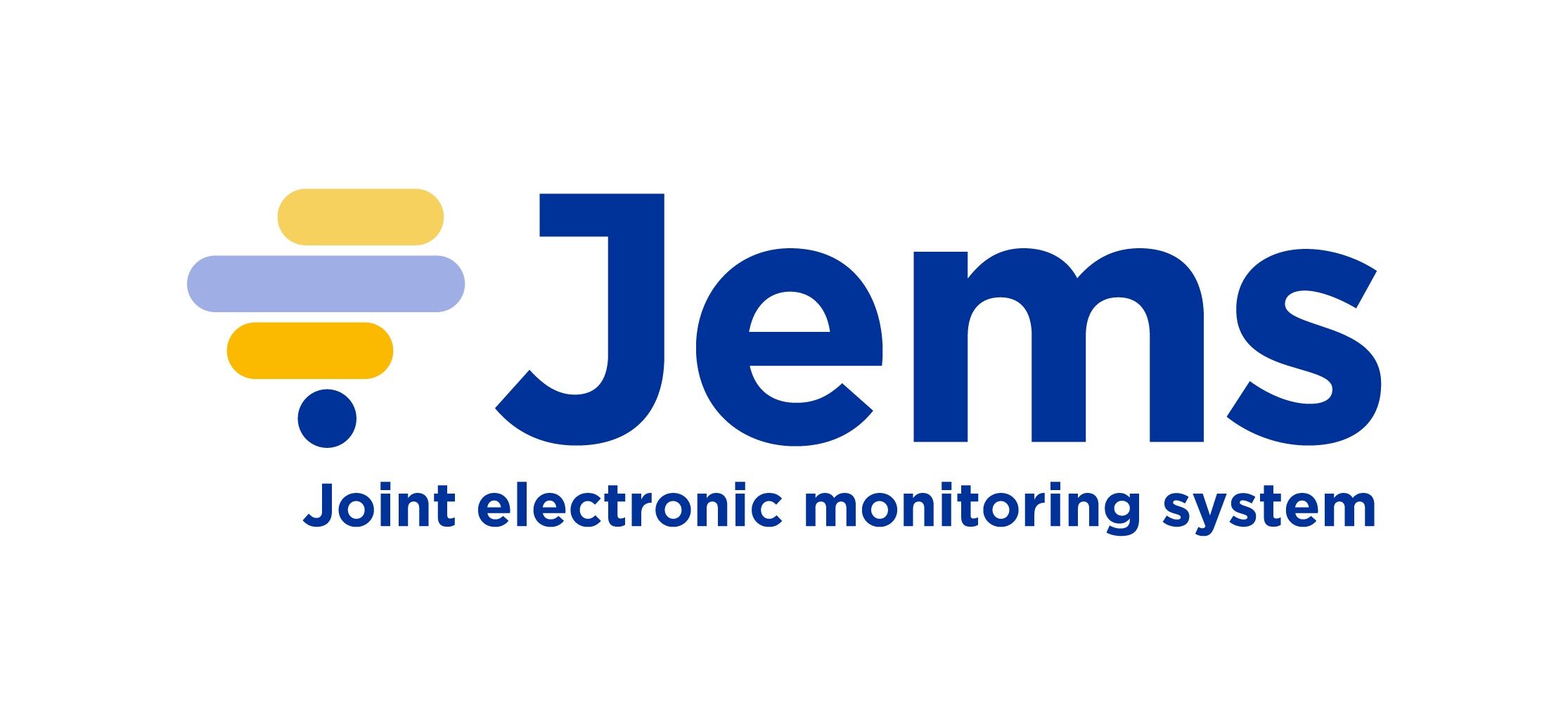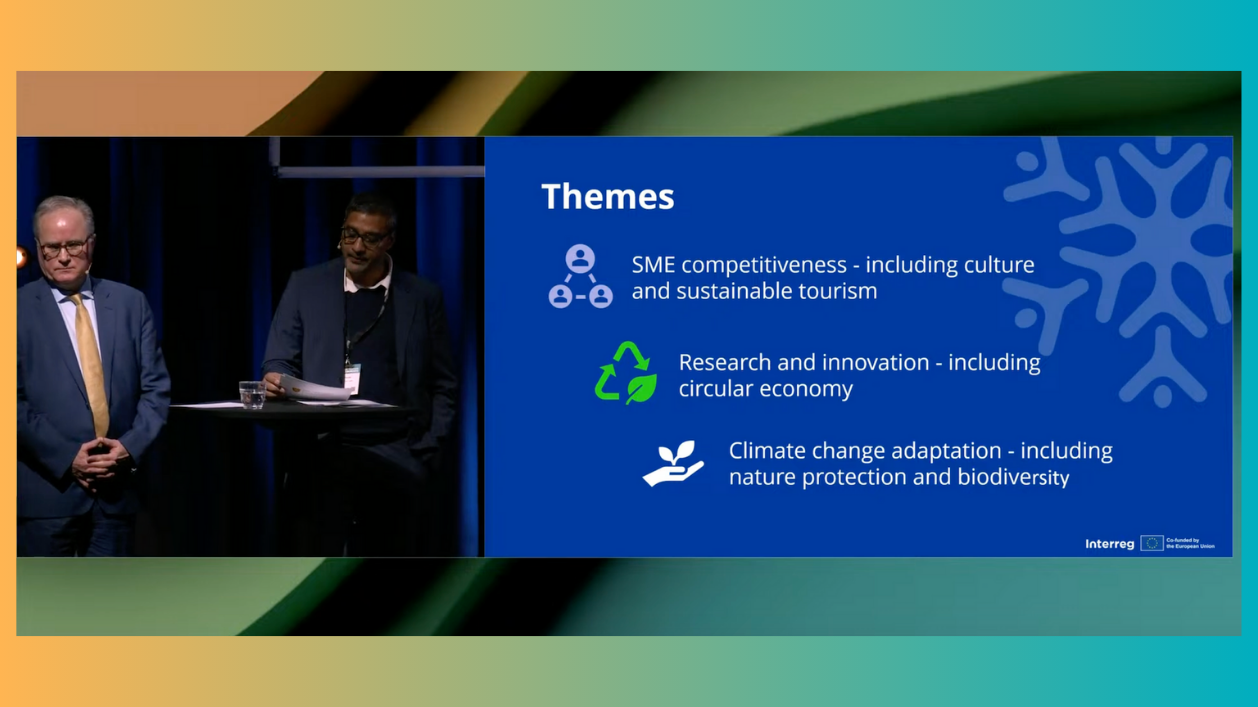Call for clustering projects
Interreg NPA and Interreg Aurora have decided to work more closely together and to facilitate synergies and clustering among Arctic and near-Arctic stakeholders.

Call outline
Overview of the Terms of Reference
In this section, we have summarised the key points of the Clustering Call Terms of Reference for transnational projects. Please make sure to download and read the full document carefully.
The Lead Partner organisation has to meet the following criteria:
- must be a public sector organisation,
- based in the NPA Programme area, unless they have a national remit that covers the Programme area.
More information about the eligibility of the Leda Partners can be found in in the Programme Manual chapter 2.2
Small-scale transnational clustering projects must involve partners from at least 3 NPA programme partner countries.
At least one partner from an ongoing or finalized project funded by the 2021-2027 Interreg Aurora programme and at least one partner from an ongoing or finalized project financed by the 2021-2027 Northern Periphery and Arctic programme. New partner(s) could be included, provided that there are clear synergies.
The partners in a transnational clustering project need to fulfil the Interreg NPA programme requirements for eligible partners, and they are expected to be located in the NPA area
Partnerships are recommended to include at least 2 of the 3 geographical zones of the programme area:
-
- Finland-Sweden-Norway;
- Ireland;
- Faroe Islands-Greenland-Iceland.
For information about eligible partners, please see the Programme Manual, chapter 2.2.
The Monitoring Committee is looking to fund projects in the following Priority and Specific Objective.
PRIORITY 3: Strengthening the organisational capacity among NPA communities to make use of cooperation opportunities.
Specific Objective 3.1: Enhance institutional capacity of public authorities and stakeholders to implement macro-regional strategies and sea-basin strategies, as well as other territorial strategies.
Themes
Furthermore, clustering projects shall comply within one of the below themes:
- SME competitiveness, including culture and sustainable tourism
- Research and innovation, including circular economy
- Climate change adaptation, including nature protection and biodiversity
Clustering means collaborating between projects from two different Interreg programmes, to transfer and reuse knowledge generated by these projects to reach beyond the scope of each of them.
The expected outcome of a cluster project is for example:
- Transfer of project outputs to other organisations, sectors and/or regions.
- Maximizing cross-border/transnational impact of existing outputs on local level, to end users or widening the preparedness for cooperation to other beneficiaries.
- Increasing the awareness of the cross-border/transnational added value and the potential of cooperation.
- Improving (the uptake of) project outputs.
The maximum total eligible project budget is 200 000 EUR, with a financing rate of 65% for all partner countries, except for Norwegian partners with a 50% intervention rate.
The support to the beneficiaries will be handled as a lump sum based on a draft budget submitted in the Application Form.
Special note for partners from Non-Member State countries!
Interreg NPA Programme funding in Non-EU Member States is nearly fully allocated. To ensure that future Interreg NPA projects can have wide transnational partnerships, the Interreg NPA EU Member States have agreed to use ERDF funding for approved Non-Member State project partners from the Faroe Islands, Greenland, and Iceland.
NOTE: When applying, Non-Member State project partners are expected to firstly select their own programme country funding source in the Application Form.
Transnational clustering projects can last a total of 12 months for project activities, excluding final reporting.
Mandatory supporting documents to be submitted with JEMS application
• PDF of signed Lead partner statement
• PDF of signed Project partner statement
It is important to always read and check the terms of reference before applying!
Interreg NPA - Specific Terms of reference, transnational clustering projects
Interreg Aurora - Specific Terms of reference, cross-border clustering projects
The call will be open for applications between 8th September 2025 and 6th October, 2025.
Organisations interested in applying for a Transnational clustering project shall submit their project proposal on Jems.
Q: Can a partner from e.g. the Finnish region of Ostrobothnia join a clustering project, even though it is outside the Interreg NPA area, but part of the Interreg Aurora programme area?
A: Yes, partners from outside the NPA area can join clustering projects, if they meet certain conditions. The country must be represented on the Monitoring Committee, and the partner’s inclusion must be well justified. For example, they may have a national role covering the NPA area or bring a unique asset that benefits the programme area.
Q: Can partners from projects completed in the 2014-2020 period participate in clustering applications?
A: No, clustering project partnerships must include partners from on-going or completed projects funded in the 2021-2027 period by Interreg Aurora and Interreg NPA.
Q: What is the minimum partnership requirement for Transnational clustering projects?
A: A transnational clustering partnership must include:
- partners from at least 3 NPA programme partner countries,
- at least one partner from an ongoing or finalised project funded by the 2021-2027 Interreg Aurora,
- at least one partner from an ongoing or finalised project financed by the 2021-2027 NPA programme
Please refer to the minimum partnership requirements in the Programme Manual.
Q: Can organisations that are not involved in an Interreg Aurora or Interreg NPA project join a clustering project application?
A: No, only organisations from ongoing or completed 2021-2027 Aurora or NPA projects can be full partners. However, organisations with no prior involvement in these projects can participate as Associated Partners.
Q: Can Norwegian partners join clustering or transnational projects?
A: Currently, the Norwegian NPA budget is very limited. Therefore, Norwegian organisations planning to apply with Interreg NPA must first contact the Regional Contact Point to learn about available funding.
The usual conditions apply to the participation of Norwegian organisations in Interreg Aurora project applications.
Q: Must clustering projects last exactly 12 months, or can they run for a shorter period, such as 8 months?
A: Interreg NPA transnational clustering projects must run for 12 months—neither shorter nor longer.
Q: What is the recommended starting date for Transnational clustering projects?
A: Transnational clustering projects are recommended to start on 1st February 2026.
Q: How can we find potential partners from the Interreg Aurora or NPA programmes?
A: We recommend checking the project database on the programmes websites, joining the LinkedIn group, filling in the Project Idea Template, or contacting Interreg Aurora or NPA staff for support.
Q: What does this mean: “When applying, Non-Member State project partners are expected to firstly select their own programme country funding source in the Application Form”?
A: In the partner section of the transnational project application form, each partner must list their funding source. For example, an Icelandic partner should select "ERDF_IS" as their funding source.
Q: Should all partners from the Interreg Aurora and NPA projects be part of the clustering project partnership?
A: No, in view of the small budget size, we recommend that you select only key partners from the respective projects, not all partners from each project. Key partners are, for example, those partners that were responsible for the results you wish to build on in your clustering project. Of course, the partnership should still meet the minimum requirements for a transnational partnership.
Interreg NPA Operations of Strategic Importance
Recognising the unique circumstances and challenges of the area compared to other parts of Europe, the clustering projects have the potential to bring strong regional and territorial development perspectives and contribute to a more coordinated implementation of territorial strategies that cover multiple programme areas, such as the EU Arctic Policy.
The Northern Periphery and Arctic programme has labelled clustering projects as “Operations of Strategic Importance” (OSIs) and specific focus will be given to communicating the projects widely and in a coordinated way.
Do not miss our webinar on 14th May 2025 to learn more about OSIs.
Do you have a project idea?
If you have a Clustering project idea, the next step is to find the right partners to start the cooperation!
Use this project idea template to present the project to potential partners, or to receive advice from the Interreg NPA and Interreg Aurora teams.
- Please send your transnational clustering project idea to Christopher Parker at the Interreg NPA Joint Secretariat.
- Please send your cross-border clustering project idea to Interreg Aurora .
Follow the programmes websites and the hashtag #InterregArcticCooperation to stay up to date. Or sign up to the Interreg NPA newsletter to receive relevant news in your inbox.
Project and partnership development
The Interreg Arctic Cooperation team supports project development through joint events and other dedicated activities.
The webinar is an opportunity to present project ideas and search for partners. Participants will be divided into 3 thematic rooms to meet projects interested in the same topics.
This event is for applicants developing a Cross-border clustering project.
Join us to receive information about call expectations, Operations of Strategic importance (OSI) and eligibility requirements based on the Interreg Aurora Terms of Reference.
This event is for applicants developing a Transnational clustering project.
Join us to receive information about call expectations, Operations of Strategic importance (OSI) and eligibility requirements based on the Interreg NPA Terms of Reference.
An Interreg Arctic cooperation Linkedin Group has been established to support networking and collaboration among partners interested in the Clustering call and cooperation within the Interreg Arctic collaboration in general.
Join the group at this link: https://www.linkedin.com/groups/14603712/
Partners of Interreg Aurora and Interreg NPA projects are invited to meet in person to get to know the projects and find the right partners for developing the best clustering projects.
Register now to the event to secure your spot. Keep an eye on this webpage for the final event agenda.
NOTE - We recommend booking your travel and accommodation as soon as possible, as options in Cork are limited.
An engaging online event designed to kick-off collaboration and inspire clustering ideas among ongoing and finalised Interreg NPA and Interreg Aurora projects.
This session laid the groundwork for the in-person partner search event in Cork on 20th March. It was an opportunity to connect, exchange ideas, and explore innovative ways to work together.
Download the presentation

Projects funded by either programme during the 2021-2027 period have the opportunity to collaborate in a clustering project. This aims to enhance outputs, achieve better results, and increase outreach for disseminating outcomes from both programmes.
How can we combine Interreg resources and skills to get the best results for Arctic and near-Arctic communities?
Join our side-event at Arctic Frontiers in Tromsø, Tuesday 28 January 2025 08:30 – 10:00, at The Edge Hotel.
Watch the recording
A summary of the event and the recording is available at this link.

Submit your application
Applications can be submitted from 8th September 2025. Applications must be submitted through the electronic monitoring system Jems, which is available on the link: jems.interreg-npa.eu.
Register on Jems



